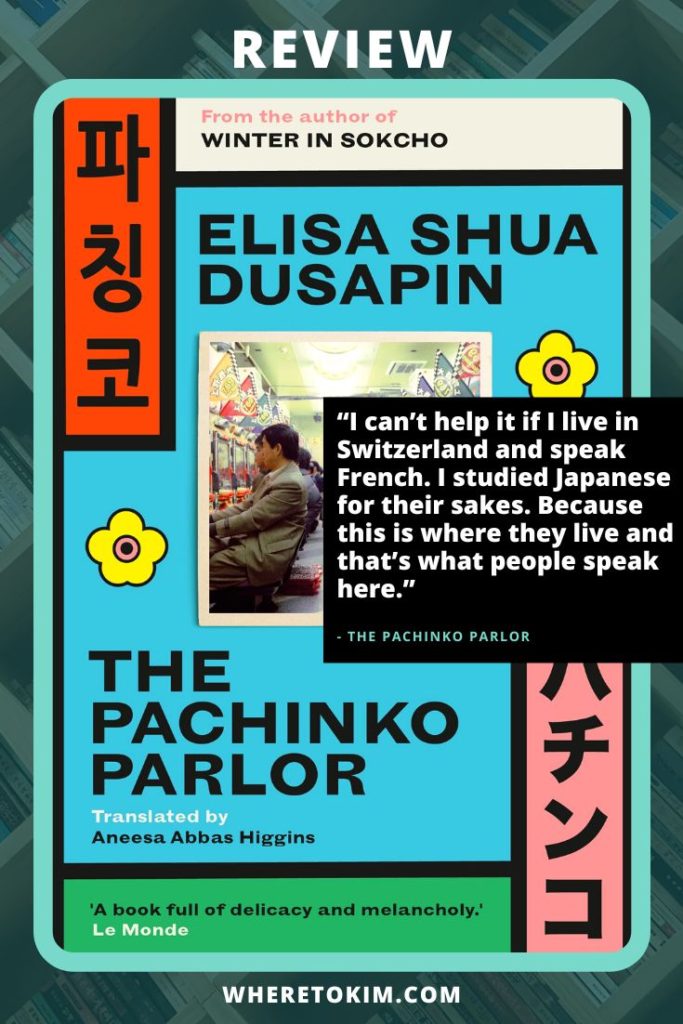The Pachinko Parlor by Elisa Shua Dusapin shows how support for another person can manifest itself in different ways despite the apparent distance.
Location: Tokyo’s Nippori and areas such as Shin-Okubo
The Pachinko Parlor synopsis
The days are beginning to draw in. The sky is dark by seven in the evening. I lie on the floor and gaze out of the window. Women’s calves, men’s shoes, heels trodden down by the weight of bodies borne for too long.
It is summer in Tokyo. Claire finds herself dividing her time between tutoring twelve-year-old Mieko, in an apartment in an abandoned hotel, and lying on the floor at her grandparents: daydreaming, playing Tetris and listening to the sounds from the street above. The heat rises; the days slip by.
The plan is for Claire to visit Korea with her grandparents. They fled the civil war there over fifty years ago, along with thousands of others, and haven’t been back since. When they first arrived in Japan, they opened Shiny, a pachinko parlour. Shiny is still open, drawing people in with its bright, flashing lights and promises of good fortune. And as Mieko and Claire gradually bond, a tender relationship growing, Mieko’s determination to visit the pachinko parlour builds.
The Pachinko Parlour is a nuanced and beguiling exploration of identity and otherness, unspoken histories, and the loneliness you can feel amongst family. Crisp and enigmatic, Shua Dusapin’s writing glows with intelligence.
Book review
The narrator, Claire, is the granddaughter of Korean Japanese (zainichi) Pachinko owners. Since coming to Japan, she feels drained. She finds herself between two identities (Korean and Swiss) and two languages (French and Japanese), in addition to inheriting the pain of the generations before her.
Distant closeness
An unlikely friendship grows between Claire and Mieko, a young Japanese girl she tutors in French. They alternate between being close, distant and awkward with each other, and I feel distanced from them by the nature and topics of their conversations.
There is a cultural barrier between all the characters and even between the narrator and her parents who are only mentioned in the book. No one is like her. But doesn’t that apply to everyone?
At the end of the book, you ponder who helped whom.
Alienating
I expected to read the same wonderful prose as in Winter in Sokcho, but I did not find it. This makes me wonder how readers without such expectations experience The Pachinko Parlor. I wrote down less about this book than I usually do in a review. That’s because it took me quite a few pages to get into the book. The first half outlining the situation felt rather plain. The story is very linear with no unexpected events. In the second half of the book, however, the characters and their feelings bridge the distance to the reader.
I liked the second half better, especially the last third that made me feel the love, sadness, support and distant closeness of the characters. In the end, I thought about the social legacy that makes your dreams fade away if you are not careful. The end of the book certainly has the same captivating qualities as Winter in Sokcho, but the pages before that are alienating.
Interested?
Buy your copy of The Pachinko Parlor from Amazon.
Book details
Title: The Pachinko Parlor
Author: Elisa Shua Dusapin
Translator (from French): Aneesa Abbas Higgins
Language: English
Publisher: Open Letter
Pages: 124
ISBN (13): 9781948830614
Publication date: 27 September 2022
About the author and translator
Elisa Shua Dusapin (1992) was born in France and raised in Paris, Seoul, and Switzerland. Her debut novel, Winter in Sokcho, was awarded the Prix Robert Walser, the Prix Régine Desforges, and the 2021 National Book Award for Translation.
Aneesa Abbas Higgins has translated books by Vénus Khoury-Ghata, Tahar Ben Jelloun, Ali Zamir, and Nina Bouraoui. Seven Stones by Vénus Khoury-Ghata won the Scott Moncrieff Prize, and both A Girl Called Eel by Ali Zamir and What Became of the White Savage by François Garde won PEN Translates awards. Her translation of Elisa Shua Dusapin’s Winter in Sokcho won the 2021 National Book Award for Translation.







